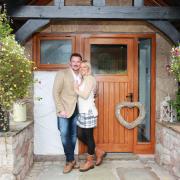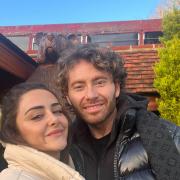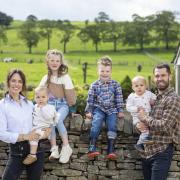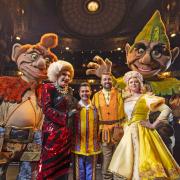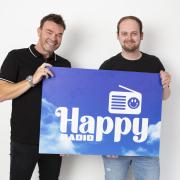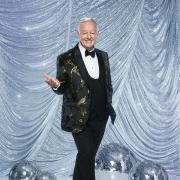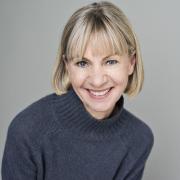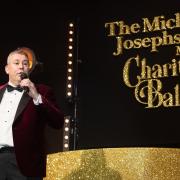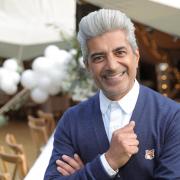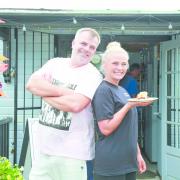Until the dust has settled on the General Election in May, Macclesfield-born and bred Nick Robinson is likely to be the hardest working man in Britain

Nick Robinson is an easily recognised face on news programmes but he was in less familiar territory in February when he was the story. He made the headlines when it was announced, just months before a general election, that he was receiving treatment for a tumour in his lung.
The BBC’s political editor hopes to back at work before polling day, but in an exclusive interview with Cheshire Life just days before his diagnosis, he revealed what a toll covering a general election can take.
‘It’ll be 24 hours without a break and last time I thought that would be fine because I could then rest all weekend but of course there’s all the fall-out of a hung parliament to deal with,’ he said. ‘It damn nearly killed me because I just had to keep going on very little sleep.’

But it could all have been very different for Nick Robinson, whose early political associations suggested he would end up on the other end of the tough questions he’s now known for asking.
He was a founder member of the Macclesfield Young Conservatives, the Cheshire Young Conservative chairman and later chairman of the National young Conservatives. He studied philosophy, politics and economics at Oxford – the degree of choice for a career in Westminster – and was president of the Oxford University Conservative Association.
His political past is raked up from time to time but he dismisses any suggestion of a lasting bias. ‘I was in Cheshire Life as a teenager at a Young Tory ball and some people will always have a problem with that, even though it was more than a quarter of a century ago but I say judge me by what I do now, not what I thought a long time ago.
‘And for those who say my previous involvement in politics means the BBC is biased, I say there are plenty of people involved in political journalism who were involved on the left of student politics. The BBC do regular polling about how key correspondents are seen and if there was a problem, I wouldn’t be in a job.’
Nick has been the BBC’s political editor since he left the equivalent post at ITN in 2005. He had previously worked on news and political programmes on radio and television and started in journalism at Piccadilly Radio as he recuperated from a car crash which claimed the lives of two friends, one the son of Manchester-born BBC heavyweight Brian Redhead.
Speaking before the successful operation in early March, Nick was looking ahead at the prospect of hectic schedule, although he plans to return to duties after “taking a short time off work”, his doctors are aiming to get him back at work in plenty of time to cover the election campaign proper.
‘On election night I will work the punishing shift, from 10pm on election night through to the following morning, then I’ll jump in a cab and go to Westminster and do a normal shift,’ he said. ‘I’ll make sure I pace myself a little better this time in the days before the election. I learned after the last election that I can’t book a holiday for straight the after the vote. Last time it took a few days for the new political landscape to be drawn up, this time there could be up to a couple of weeks of haggling. No-one knows how it will finish and the winner might not win. It’s not impossible – if no party can form a government on their own – that the party that comes second will do a deal with the parties that come third, fourth and fifth, leaving the party that polled most votes in the cold.’
That is a situation that seemed impossible when Nick’s predecessor Andrew Marr held the post during Labour’s dominance of the early 2000s. Now though, the rise of the smaller parties has transformed the political landscape and the media has had to change too.
‘It’s a move to a more continental style of politics, with more coalitions, more pacts and for me it’s more interesting because it’s more unpredictable,’ Nick said. ‘In the old days a tv news piece was relatively simple: this is what the main party says, this is what the opposition says and then maybe a comment from the third party. Now there are more voices that need to be heard and it is definitely challenging.
‘This is the most unpredictable election I can remember and the stakes are incredibly high. We have to make sure we don’t just tag the smaller parties on and that we ask them the tough questions we are asking the more established parties. They need to be challenged in the same way as the Tories and Labour.
‘Politicians can only communicate through people like me, although that is changing because of things like Twitter and Facebook, and during any election we have a duty to broadcast some of what the politicians want to tell us. We have an obligation to tell you what they want to say but I try to put it through a filter and ask if it’s news, if it’s relevant.
‘It is easy to think of politicians as all being the same and for us to focus on the ‘he said, she said’ rows between the leading politicians and get stuck in that mud rather than looking at what people want us to be looking at. I know I have an amazing privilege to be able to talk to the people at the heart of the big decisions and ask them the questions other people want me to ask.’
He has been asking those questions for ten years and is now one of the longest serving political editors the BBC has had and although he says he has no plans to leave the post yet, he admits it would be surprising if he’s still there by the time of the next general election.
Any change of role would be sure to give him more time to indulge in his other passions – walking, sailing and watching Manchester United. The day before our interview he had been rambling in the hills near Macclesfield and once the dust has settled on the election he intends to get away from Westminster and spend some time at his cottage near the Suffolk coast.
‘We’ll do some sailing and some walking and some drinking pints,’ he said. ‘I’m back in Macclesfield quite a bit – my mum still lives there and my brother and sister are in Cheshire too. I have two United mad teenage sons as well so I try to get to old Trafford as often as I can.
‘I come to Macclesfield on the train and I’m always struck by how it’s changed. I’d get lost if I were driving there now and I used to know it pretty well. It was sad news about Astra Zeneca but Macclesfield still has an awful going for it.’
Nick’s top three
The BBC political editor chooses three favourite things to do in and around Macclesfield:
Go walking in the Macclesfield Alps and enjoy the glorious fresh air in Macclesfield Forest, Tegg’s nose and over the border in Derbyshire. It always amazes me how many people in Cheshire don’t go there.
As a child my dad would always take us to see the rhododendrons at Tatton Park, that’s something I remember fondly.
Go and watch the Silk Men. I’m not going to claim I was always a big fan because I wasn’t, I have been a terrible traitor to my home town team by being a lifelong Manchester United fan but I have been to watch Macclesfield a few times in more recent years and I have seen them when they’ve played in London.
Thank you for the many kind and generous messages. Here's hoping to be back reporting the news soon






